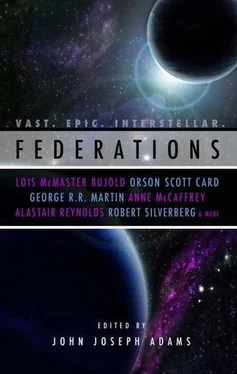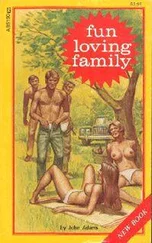“So she’s boring.”
“You won’t think so,” Didge said gloomily. “Biologicals find the Abundance fascinating.” Under her breath, Didge added, “For some reason.”
“Why don’t you like her?” the Union asked.
“She’s one of those federations who’s all about appearance. ‘Ooo, let’s pass a law to make the water clearer and the skies more blue’… not because it’s healthier but to improve the tourism photos and the view from penthouse apartments. ‘Let’s make the peasants dress in colorful national costumes. Let’s provide free cosmetic surgery and eugenic selection for better skin.’” Didge grimaced. “The Abundance isn’t evil; she’s just shallow. You can do better.”
“With whom?” the Union asked.
Didge didn’t answer. The Union looked at her blankly.
After a while, the Union said, “It’s only one date. And frankly, ‘good-looking and not evil’ sounds pretty appealing. I’ve had enough drama.”
Didge sighed. “I’ll set it up.”
• • •
The process went quickly. Unbeknownst to the Union, Didge had acquired enough expertise in inter-cultural communications that she’d developed a modest reputation as a matchmaker. It was Didge who’d paired the Silicon Syndicate with that Dyson sphere utopia, and to the surprise of the entire galaxy, the two had hit it off. The utopians enthusiastically embraced every available cyber-augmentation, while the Syndicate—the cynical Syndicate, famous for its link-’em-and-leave-’em seductions—had been rejuvenated by the innocent sense of wonder shown by the utopians as they ventured out into the stars for the first time. Meanwhile, Didge had also matched up the anti-art Bloc with Emancipation of the Flesh™… and the Newly Emancipated Bloc of Like-Minded Trading Partners™ was already planning an offshoot bloc-ette in a nearby globular cluster.
As for the Inner Worlds Abundance, she’d been sending out signals for a long, long time—well before the Union started looking for a mate. Didge couldn’t say why she’d never mentioned these signals to the Union; they’d just struck her as over-eager. Didge knew the Union would probably like the Abundance’s outgoing personality, but in Didge’s eyes, the Abundance was smarmy: the sort of culture that sent cute little thank-you notes after concluding any trade agreement, and never missed an excuse to broadcast candid pictures of itself.
But if that was what the Union really wanted… Didge gritted her metaphoric teeth and made the call.
• • •
In the Kuiper belt of the Abundance’s central star system, the Union’s delegation parked behind a dwarf planet to clean their spaceship. The diplomats didn’t set out again until the hull was gleaming.
Back home, Didge muttered, “That’s so superficial!”
The Union said, “But I want to make a good impression.”
“The impression should come from the ship itself. My designs give it more speed and range than anything the Abundance has ever seen. Their technology is really quite primitive—they should spend more on research and less on getting shiny.”
“There’s nothing wrong with caring about one’s appearance.” The Union glanced at Didge. “It wouldn’t hurt you to primp a bit.”
“I don’t primp . I have real work to do— your work.”
“Then relax, take a break. Design some better-looking containers for your processors. Don’t you get tired of black boxes?”
“Black is classic!” Didge snapped.
“Okay, whatever,” the Union said. “Now shush, my delegation is about to meet the Abundance.”
The Abundance had said there would be no ceremony—just a quick hello to her board of directors before she and the Union departed for an intimate little moon where they could get to know each other. The Union was still new to the courtship game, but not entirely naïve; when the quick hello turned into three weeks of pomp and circumstance, the diplomats weren’t surprised. In fact, the Union’s delegation had got Didge to whip up gifts for the Abundance’s leaders; Didge had produced gaudy trinkets that did nothing, and as she expected, the useless doodads went over with oohs and ahhs .
Sullenly, Didge watched as the welcoming ceremonies wound to a flashy conclusion, the choreography clearly calculated to impress biological minds. Flamboyant music. Fireworks. Tinting the sun mauve. Didge wanted to imagine it was all a sinister ploy: that the Abundance was actually luring the Union into a trap, and that as soon as they were alone, the Abundance would cold-cock the Union diplomats and plant slave-controllers in their brains. But Didge knew it wasn’t true—the Abundance simply enjoyed extravaganzas and leapt at any opportunity to stage them.
Didge thought, She likes dressing up. The Abundance isn’t even showing off for a new suitor. She just admires the sight of herself when she’s well turned out.
Didge tried to despise the Abundance’s indulgent vanity; she didn’t quite succeed. Her silicon soul contained a tiny chip of envy for any entity that was comfortable with itself.
• • •
The Union flew the Abundance to their planned tête-à-tête. It went as well as Didge had feared: pleasant talks, much in common, discussions that quickly went beyond mere trade and into “cultural exchange”—maybe even some joint colonization efforts to see how the two federations got along.
The word “stimulus” cropped up frequently. When the Union feigned a casual manner and spoke of feeling under-energized, the Abundance said she felt the same. “I’ve felt like something’s missing, for years and years and years. Oh, sure, I have lots of fun , but sometimes I wonder where I’m going. I have many spiritual people—the poor are so natural , aren’t they? Simple, but so in touch . Overall, though, I just long for something to happen . Something that would turn my life around.”
“An infusion of new blood?” the Union suggested.
“Maybe,” the Abundance answered coyly.
The meetings continued, being broadcast to both federations. People watched the proceedings whenever they could, each one hoping this would be it . At the start, the Union imposed a delay of five minutes on the broadcast—no repeating the Commune fiasco—but after a while, without any official decision, the delay gradually shortened to nothing. The Union’s populace wanted immediacy: to experience the Abundance as first-hand as possible. New arts, new technologies, new ways of seeing the universe… yet not too weird, just spicy. Nothing challenging or disruptive.
The idea of integrating arose so naturally that no one could say who first proposed it. Early on, the possibility was treated as a playful fantasy: suppose we built a space fleet together; suppose we collaborate on a mission to another galaxy; suppose, just for laughs, we built our own Dyson sphere utopia (only not a serious utopia, just a nice vacation resort). Over time, however, the pie-in-the-sky dreaming became concrete—turning from airy chatter into more tangible logistics. The two love-birds kicked around methods of merging until finally the Union said, “We’ve really got something here. I think it’s time to have Didge work out the details.”
The Abundance stared blankly. “Who’s Didge?”
And that was their first big fight.
• • •
The Abundance used computers, but never allowed them to achieve intelligence, let alone form a unified consciousness. The leaders of the Abundance (and its Zeitgeist as a whole) firmly believed that the help should never get ideas. “It just isn’t done ,” the Abundance told the Union. “You have to set boundaries or the poor dears get confused.”
Читать дальше












